Introduction
As the fourth successor of the product that defined what a phablet should be, Samsung Galaxy Note5 is arguably the most radical release in the product family to date. The newcomer marks a noteworthy departure (no pun intended) from all of its predecessors in terms of both design and available hardware features.
Top notch specs are always to be expected from a Samsung Galaxy Note
and the latest iteration surely delivers on this front. The Galaxy Note5
packs the most powerful chipset in the business, the fastest memory,
and one of the best cameras around. The S Pen is here too - clickable
and more productive than ever.
Brand new look and premium materials ensure that Samsung Galaxy Note
feels as premium as its hardware requires. Take a look at the full list
of key features the Note5 has to offer below.
Key features
- 5.7" QHD (2560 x 1440 pixels) Super AMOLED display with 518ppi
- 64-bit Exynos 7420 chipset with 14nm architecture; octa-core CPU (quad 2.1GHz & quad 1.5GHz), Mali-T760MP8 GPU
- 4GB of LPDDR4 RAM; 32/64GB of UFS 2.0 flash memory
- Android 5.1.1 Lollipop with TouchWiz UX
- 16MP f/1.9 camera with OIS; Auto HDR; 4K video capture; IR white balance detection sensor, Pro mode and RAW shooting
- 5MP f/1.9 front-facing camera
- Cat. 9 LTE network support; WiFi 802.11 a/b/g/n/ac (2.4/5GHz); GPS, GLONASS and Beidou; Bluetooth 4.2; NFC; MST mobile payment support
- 3,000mAh non-removable battery; Qi (WPC) and PMA wireless charging support
- Fingerprint scanner
- Heart-rate monitor
- Redesigned clickable S-Pen
- Metal chassis; Corning Gorilla Glass 4 front and back
- Wired and wireless Quick Charging
Main disadvantages
- No microSD card slot; no 128GB built-in memory option
- The battery is not user-replaceable
- No IR port
- No enhanced resistance to liquids or dust
- No stereo speakers
- The body of the smartphone is quite slippery without a case
- Not available in key global markets (at least for the time being)
The combo of a beefy Exynos 7420 chipset, ultra-sharp Super AMOLED
display, and speedy memory should hardly catch anyone by surprise. The
setup debuted on Samsung Galaxy S6 and Galaxy S6 edge and is yet to have
its performance matched by a rival.
Dropping the memory card slot and the removable battery from the
Note5 specs surely raises eyebrows - both hardware features have been a
staple for the product family since day one. Samsung appears confident
that the bevy of available charging options will keep users happy.


Samsung Galaxy Note5 official photos
As always, we will kick our Samsung Galaxy Note5 review with an
unboxing, followed by an overview of its design and build. Head over to
the next page for a closer look at the flagship phablet.
Unboxing
Samsung Galaxy Note5 unsurprisingly features a retail box with the
same design as that of Samsung Galaxy S6. Its contents include the
handset, wall charger, microUSB cable, stereo headset, and replacement
tips for the S Pen.

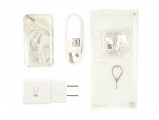
The retail package
As far as basic accessory needs go, the Note5 has you covered right
out of the box. Samsung is offering a range of optional accessories for
the flagship phablet.



Flip covers and fancy backs • Fast wireless charging pad
The hardware keyboard case is arguably the coolest accessory
available for the Note5. It covers the bottom quarter of the display,
but the UI adjusts accordingly, so you don't need to remove it to access
the dialer, for example.


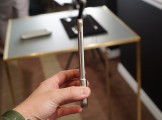
QWERTY keyboard case on the Galaxy Note5
You also get hardware Task switcher/Home/Back buttons, since the ones
underneath are inaccessible. When you don't need the keyboard, you can
simply snap it on the back of the case and continue in full screen mode.
Samsung Galaxy Note5 360-degree spin
The Samsung Galaxy Note5 is undoubtedly a big device. It measures
153.2 x 76.1 x 7.6 mm and weighs 171 grams making it shorter, narrower,
thinner and lighter than its predecessor Galaxy Note 4 all the while
retaining the 5.7" display.
Design and build quality
Samsung Galaxy Note5 features the design language that debuted
alongside the Galaxy S6 and Galaxy S6 edge, dominated by a decidedly
premium fusion of metal and glass. The most distinctive design feature
in the phablet is its back, which is curved towards the edges - a unique
touch in a Samsung device for the time being.

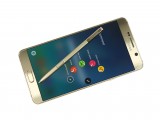
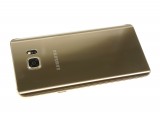

Samsung Galaxy Note5 in the flesh
There is no denying that Samsung Galaxy Note5 is the best looking
member of the product family to date. The handset finally looks as
premium as its price tag and industry reputation require, yet it cannot
be mistaken for anything other than a Samsung Galaxy Note.
Samsung Galaxy Note5 will be available in four colors - Black
Sapphire, White Pearl, Gold Platinum and the newly introduced Silver
Titanium. It is worth noting that color availability will vary by
markets.

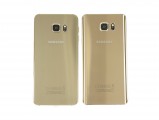
Samsung Galaxy Note5 and Galaxy S6 edge+ in Gold Platinum
Build quality of the Samsung Galaxy Note5 is exceptional. The handset
is crafted entirely from metal and Corning Gorilla Glass 4, so it will
stand up even to the demands of the heaviest power user.
The only downside of having a smartphone made of glass is that the
material might be prone to cracking in an accidental drop. A protective
case is therefore highly recommended.
With physical measures of 153.2 x 76.1 x 7.6 mm, Samsung Galaxy Note5
is considerably more compact than Samsung Galaxy Note 4 (153.5 x 78.6 x
8.5 mm). The 2.5mm difference in width between the two devices is
particularly impressive - it makes the new Note feel considerably more
compact than its predecessor despite packing a screen with the same
size.


Samsung Galaxy Note5 alongside its predecessor
At 171 grams, the new Note is also lighter than last year's model
despite utilizing more premium materials. All in all, the handset is a
massive improvement over the outgoing model in terms of physical
measures.
Samsung Galaxy Note5 is quite possibly the easiest device with a 5.7"
display to handle thanks to its fairly compact measures, which allow
many common tasks to be performed with one hand. Users with small hands
however, might find the device a tad slippery without a case.
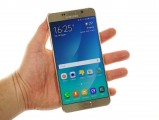
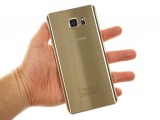
Handling Samsung Galaxy Note5
The tactility of the smartphone is superb thanks to the premium
materials used in its making. However, the same materials make the Note5
prone to smudges.
Display
Samsung Galaxy Note5 comes with a 5.7" Super AMOLED display with QHD
(2560 x 1440 pixels) resolution, which results in a pixel density of
518ppi. The diagonal sweet spot was already established with the Note 3
and for third generation in a row it has remained unchanged.
The Galaxy Note family has always boasted some of the best displays
in the business and the tradition continues with the latest iteration.
Alongside the usual infinite contrast, the screen boasts accurate colors
(you can still make them saturated in the settings), as well as top
notch brightness and viewing angles.



Samsung Galaxy Note5 packs a stunning display
Viewing angles are great though you might see a minor blue/green tint at steeper angles (it's not uncommon with OLEDs).
If you boost the brightness slider you can reach the brightness
levels of a good LCD. Keep in mind that in very bright conditions the
auto brightness mode can push the screen brightness up to 620nits along
with the screen contrast and color saturation. This alone makes it the
brightest SuperAMOLED display by Samsung that we've tested – brighter
than even the S6 edge+.
These sorts of brightness levels can be easily beaten by the
competing smartphones with LCD screens, but the amazingly low
reflectivity of Samsung's SuperAMOLED displays means you can keep the
brightness slider down even in bright sunlight conditions and still
enjoy legible screen contents.
The Screen mode setting allows you to choose a color temperature,
contrast and saturation preset that best matches your preferences. We
found the Basic setting to provide the most accurate colors (average
DeltaE 2000 of 2.5 is at the level of calibrated display), though with
this mode you might find the screen image to lack some punch in terms of
contrast.
If the screen looks too bland to your taste at Basic mode, we suggest
you go for the AMOLED photo mode, which is still acceptably color
accurate (average DeltaE 2000 of 5) but it boosts the contrast along
with the saturation of some individual colors such as the greens or the
magentas. The AMOLED video mode pushes colors even further and so does
the Adaptive display mode, so it would be up to your personal preference
which one you would use.
| Display test | 50% brightness | 100% brightness | ||||
| Black, cd/m2 | White, cd/m2 | Black, cd/m2 | White, cd/m2 | |||
| 0.000 | 183 | ∞ | - | 439 | ∞ | |
| - | - | - | - | 620 | - | |
| 0.000 | 172 | ∞ | - | 410 | ∞ | |
| - | - | - | - | 540 | - | |
| 0.17 | 208 | 1197 | 0.52 | 705 | 1361 | |
| 0 | 149 | ∞ | 0 | 372 | ∞ | |
| 0 | 291 | ∞ | 0 | 399 | ∞ | |
| 0 | 208 | ∞ | 0 | 473 | ∞ | |
| 0.000 | 208 | ∞ | 0.000 | 473 | ∞ | |
Sunlight legibility is excellent too. Samsung has once again tuned
the display to go above the brightness level that's available to the
user when in bright environment. The feature allows you to read your
email even under direct sunlight.
Controls
Above the display is where the earpiece resides, accompanied by an ambient light and a proximity sensor. The 5MP front-facing unit completes the setup.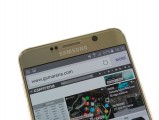
The view above the display
Samsung's signature home button sits below the screen of the Note5 - it packs a fingerprint sensor and is surrounded by a metal ring. A duo of capacitive keys flank the button as always.

The usual trio of buttons below the screen
The volume control buttons of the phablet sit on its left side. Its power/lock key is placed on the right.
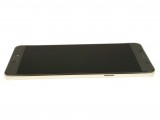
The sides of Samsung Galaxy Note5
The top of the Note5 is home to the nano-SIM card slot and a secondary microphone for active noise canceling. There is no IR port this time around.
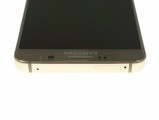
No IR port on top of the device
The bottom of the smartphone features similar layout as Samsung Galaxy S6, save for the S Pen slot. The device's loudspeaker, its 3.5mm audio jack, and its microUSB port are all located there.

The bottom of the handset
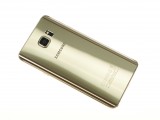
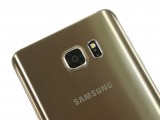

A look at the back of the phablet
S Pen
Samsung Galaxy Note5 features a brand new S Pen that's once again an improvement over last year's solution. The stylus utilizes a new release mechanism which requires a user to click its top before taking it out, thus eliminating the possibility of accidentally removing it.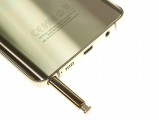
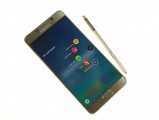
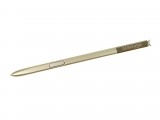
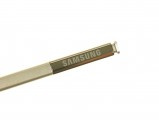
A new and improved S Pen
The signature side button is once again present on the S Pen. Curiously, Samsung has opted for the smooth texture on the stylus, thus making it more slippery than its predecessors.
We really wish that the clickable top of the S Pen offered additional functionality. For the time being it can only act as a release mechanism and an occasional clicky stress reliever.
Battery life
This is arguably the part of the review that we were most curious about. As you probably know by now, Samsung equipped the Galaxy Note5 with a non-removable 3,000mAh Li-Po battery that's smaller than the swappable 3,220mAh Li-Ion battery found in last year's Galaxy Note 4.As it turns out, despite its smaller battery, the Samsung Galaxy Note5 pulled off almost the same result as its predecessor in our battery test. The newcomer achieved an endurance rating of 85 hours, which means it will easily make it through three full days if you use it for an hour each of telephony, web browsing, and video playback daily.
Samsung’s quick charger can top up the battery in less than 90 minutes from empty, so it is incredibly convenient to use. Wireless charging, on the other hand is so fast and so liberating, that there'll be no turning back. You're fully charged in just 120 minutes.
As always, there are two battery saving modes available to the user - Power Saving and Ultra Power Saving. The latter turns off all, but the most crucial phone features and allows the phablet to last for hours with single percentage digits of battery left.
Combined with the plethora of options to rapidly charge the phablet, we reckon that the battery endurance of Samsung Galaxy Note5 should be good enough for even a seasoned power user. Yes, a removable battery would have been a great thing to have, but we find the sleek metal/glass body of the Note5 to be a fair tradeoff.
You can also always get an external powerbank as these accessories are at their cheapest now.
Connectivity
Samsung Galaxy Note5 packs a kitchen sink full of connectivity options, headed by Cat. 9 LTE connectivity with support for download speeds of up to 450 MB/s. If you have access to an HSPA network only, you'll get a maximum download speed of 42Mbps.Samsung Galaxy Note5 supports Wi-Fi ac networks for fast local networking. Wi-Fi a/b/g/n at 2.4GHz and 5GHz networks are also supported, of course.
Then there's Bluetooth 4.2 LE with apt-X codec support (for high-quality audio streaming). Wired connectivity takes place over microUSB 2.0 port.
The USB has MHL 3.0 functionality, which allows it to output 2160p video at 30fps, coincidentally the top mode for the camera. The port also supports USB HID devices, like a keyboard and a mouse.
There is also NFC, which is used for Samsung Pay, which lets the Note5 replace the credit cards in your wallet. It's also used for pairing with other devices and reading NFC tags as well.
Oddly, Samsung opted to leave the IR blaster off the Galaxy Note5, so remote controlling your home appliances is a no-go this time around.
User interface
Samsung Galaxy Note5 boots the latest Android 5.1.1 Lollipop, dressed in the Korean manufacturer's TouchWiz UX. The company has been polishing and perfecting its user interface for quite some time now, and the latest iteration is one of the most capable custom takes on Android available around.The lockscreen shows two notifications - additional ones get collapsed and you only see their icons. You can tap the down arrow to see the full list. If an app gets too pushy, you can hide its notifications from the lockscreen. There is also weather information for your location and pedometer stats.




The lockscreen shows notifications • tweaking the settings
Dialer and camera shortcuts are available, but we prefer the other camera shortcut - double-tap the Home key from anywhere in the UI and the camera launches within a second.
Private mode returns and it utilizes the excellent fingerprint reader. After you've trained it, you only need to place your finger for half a second for it to recognize your finger. It's also quite lax when it comes to finger orientation too, no more struggling to swipe just the right way as it was on the Note 4.


Private mode
Private mode creates a secure folder that disappears when the mode is disabled. You can have Private mode automatically disabled every time you lock the phone.
The lockscreen can also use the fingerprint reader as a locking mechanism. It's quicker and more convenient than swiping and more secure than simple patterns or PIN.
A nice feature allows you to hide the content of the lockscreen notifications or disable them altogether, so people can't snoop on your received messages and emails.
Smart Lock disables the secure locking options when a trusted device is connected (Bluetooth smartwatch or car stereo or an NFC sticker) or when the phone is in a trusted location. Unfortunately, that's determined by geo-positioning only, you can't add a trusted Wi-Fi network.
Just like Samsung Galaxy S6, the Note5 offers support for themes. We got three preinstalled on the Galaxy Note5, but you can download more in the Galaxy Apps store, including an Avengers theme (Samsung is the chief supplier of lots of Avengers tech movie props). Themes can change the wallpaper and icons, core apps such as dialer, contacts, and messages, as well as the notification area.



Themes are a great addition to the UI
The homescreen itself is quite familiar. You get the optional FlipBoard Briefing pane on the left, which pulls info from a selection of news sources on topics you find interesting. There's an option to change the screen grid between 4x4, 4x5 and 5x5, the smallest one is the default.

Familiar homescreen
The wallpaper now has a subtle motion effect that we didn't notice at first.You can disable it in the wallpaper settings if you wish.
The notification area has one side-scrollable row of quick toggles. Some have text underneath, showing you the name of the Wi-Fi network you are connected to for example.

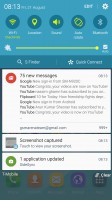


The notification area
The brightness slider is below that and then the S Finder and Quick connect buttons. One cool feature is that while adjusting the slider, the notification area fades away so you can see the app you were using before.
You can rearrange the quick toggles by tapping the Edit button. The S Finder and the Quick Connect shortcuts can also be removed if desired.
The Samsung Galaxy Note5 comes with a page and a half of icons in its app drawer, but several folders conceal the actual number of pre-installed apps. Some of the latter are organized in folders.


The app launcher
Multi Window is part of the app switcher. TouchWiz uses Lollipop-style 3D rolodex of apps, but next to the X button is a button that opens the app across half the screen. The other half is filled in with a similar rolodex with only apps that support Multi Window.



App switcher and multi-window view
Another way to launch Multi Window is to long press the App switcher key. If the current app supports Multi Window it will shrink to half the screen, the other half will be taken up by the icons of supported apps. If not, you just get the list of apps.
The Settings menu features customizable Quick settings - a selection of the most used options you can use. Below that is the full list, though we prefer using the search function as the extensive features that Samsung has provided can be hard to track down among menus and submenus.



The settings menu
S Pen
As expected, Samsung Galaxy Note5 features improved S Pen software over last year's model. Users can now take notes with the screen off as soon as the take the stylus out of the Note5.
Taking a quick note
Air command has been greatly improved too - it can optionally float anywhere you want on the screen. Users can also add custom shortcuts of three apps of their choice.
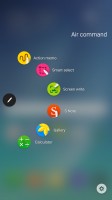
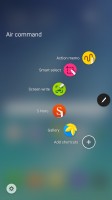
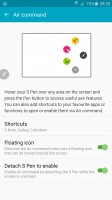
Air command
Action Memo, Smart select, Screen write, and S Note are at your service as always. Their functionality is a great as it always has been.




Action Memo • Smart select • Screen write • S Note
The S Pen has a dedicated menu in the settings. It allows users to control all aspects of the experience that the stylus delivers.
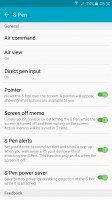

S Pen settings
To sum things up, Samsung Galaxy Note5 delivers superb UI and S Pen experience. Performing tasks on the smartphone is fluid and intuitive, while the available themes allow users to have the appearance of the UI their way.
Performance
Samsung Galaxy Note5 packs an Exynos 7420 chipset developed in-house
by Samsung with 1.5 GHz quad-core Cortex-A53 CPU, 2.1 GHz quad-core
Cortex-A57 CPU, Mali-T760MP8 GPU, and 4GB of RAM. Save for the slight
bump in RAM, the hardware setup is the same as in Samsung Galaxy S6 and
Galaxy S6 edge.
First up is the CPU-centric Geekbench 3 test. Rather unsurprisingly,
the Galaxy Note5 and Galaxy S6 edge+ performed right in line with the
Samsung Galaxy S6 family.
Samsung surprised quite a few people by opting for the Exynos 7420 in
the Note5 - previously, the Korean giant utilized exclusive chipsets for
the product range. However, no one should knock the manufacturer for
choosing this route - the 14nm 7420 is roughly a year ahead of its
closest competitor in terms of performance, heat management, and power
efficiency.
Phonebook and telephony
Samsung Galaxy Note5 has excellent reception and in-call audio. If
you run the Adapt sound feature, you can also tune the call sound when
you use a headset.
The dialer has a Material Design-inspired appearance. Smart dialing
(searching through contacts by using the keypad) and speed dialing
(assigning a contact to a number on the keypad) are on board. Video
calling is also natively supported.
Additional tabs in the app show the call log, favorite contacts and a
list of all contacts. You can use the separate Phonebook app for that.




The dialer app
The Phonebook is a list of contacts with a search field and an
alphabet index. The contact info card has been cleaned up and shows the
contact image (you can swipe down to view it fully), below that are the
phones and emails with quick buttons to call/send message.
Here you'll also find the latest messages and calls with that
contact. The View more toggle displays all the additional info. You can
swipe left to call a contact straight from the list, or right to send
them a message.



The phonebook
A built-in call rejection feature lets you block calls from certain
numbers or all numbers not in your phonebook. Do not disturb mode can be
scheduled on select days and during certain periods of the day. You can
set it to make an exception for certain notifications, including
allowing only calls from your favorite contacts.
Samsung is sticking to a single loudspeaker with the 2015 generation of
the Galaxy flagships, but it has audibly improved in quality. It's not
very loud though, but we can forgive it for the excellent sound quality.
Obviously Note5 and S6 edge+ share the same model of loudspeaker and
both score Average on our test.
The great speaker quality and wider sound range somewhat makes the
Galaxy Note5 speaker sounds louder than it actually is, especially when
compared to some low-quality (but louder) squeaky speakers.
Even though the Galaxy Note5 score is Average, you'll hardly miss
notifications even in noisier environments.
| Speakerphone test | Voice, dB | Ringing | Overall score | |
| 67.3 | 65.7 | 66.5 | Below Average | |
| 65.8 | 64.8 | 70.4 | Average | |
| 65.3 | 64.6 | 73.5 | Average | |
| 65.2 | 64.6 | 76.1 | Average | |
| 68.1 | 66.3 | 73.7 | Good | |
| 69.7 | 66.5 | 73.5 | Good | |
| 66.9 | 71.8 | 74.7 | Good | |
| 70.7 | 66.6 | 78.0 | Good | |
| 73.5 | 67.7 | 78.7 | Very Good | |
| 74.7 | 73.5 | 81.6 | Excellent | |
| 75.7 | 73.5 | 80.7 | Excellent |
Messaging
Samsung's messaging app has a clean UI, but you can customize font
size, backgrounds and conversation bubbles. The app shows a row of
priority contacts, below that is the list of all conversation threads.
You can use pinch zoom to change the font size in a conversation thread.
The Album option collects all photos and videos shared in the given
conversation thread. The Attach button shows the most recent photos and
videos so you can pick them easily, but below that are additional
options for other multimedia.


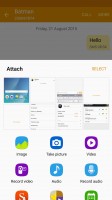

A capable messaging app out of the box
A built-in spam filter weeds out messages from select numbers or
containing certain phrases. You can also schedule messages to be
automatically sent later (so you don't forget).
The proprietary Email app by Samsung looks almost identical. The top
row is a shortcut to show emails only from priority contacts, though you
can view a combined inbox if you have multiple accounts added.
The Gmail app also handles multiple accounts - even non-Google one -
and adheres more strictly to the Material design principles. It is an
excellent alternative to the Samsung's solution.
The Samsung keyboard features a dedicated numbers row. It can update
its database with popular words weekly and learn from your messages and
contacts. Swiping can be set to move the text cursor or as an input
method.


Excellent keyboard by Samsung
You can tweak the size of the keyboard slightly, making it taller or
shorter and, if you are okay with a tiny keyboard, you can use a small
floating one. You can add text shortcuts (so 'brb' gets replaced with
'be right back') and predictive text.
Of course, you can also input text with the stylus. The setup is quite convenient on the large screen of the Note5.

S Pen text input
Gallery
The gallery's default view shows photos grouped based on time.
Thumbnails are shown on a clean white background and you can change
their size with a pinch zoom gesture.
Events uses time and location to group photos and automatically
create "Video highlights," a slideshow accompanied with music. You can
export that to a video to share on your social network of choice.



The gallery app
The Categories view groups multimedia by type - pictures, videos,
slow-mo videos, Virtual shots and so on. The People category groups
photos based on the faces in them. There's also a Documents category.
You can use the Search shortcut to look for photos based on category,
people, time, event, location and so on.
Batch operations are gone, but you can easily move photos to Private
mode (this requires activating the mode). Editing tools include simple
things like Auto adjust, crop and rotate, but you can also do collages
and go into the Photo editor, which is the usual Android editor with
more advanced crop and rotate tools, color adjustment, effects and
dedicated portrait enhancements (slim face, large eyes, you get the
idea).
The Share button allows you to send a photo to a device over DLNA, to
a TV using screen mirroring or to a wireless printer. Samsung also has a
special feature to send profile photos and high-resolution images to
your contacts as a sort of mini social network. For non-Samsung devices,
recipients get a link over text message, the link expires after a
certain period.



Editing an image • sharing a photo
Music player
Samsung's TouchWiz music player used to be one of the most
feature-bloated apps, but the company has done some work to trim the
fat. The app looks very clean now, essentially it has just two screens.
One lets you browse tracks and playlists, with a dropdown menu to
switch between views including Folder view. The Music square is gone.
The other screen is the Now playing with album art and a few playback
controls. You can transfer playback to a Bluetooth or a DLNA device.



The music player has a clean interface
SoundAlive has gotten rid of the square view too, now it has two
dials - one changes the balance between bass and treble, the other
between instrumental and vocals. You can tap the Details button for a
manual 7-band equalizer. Audiophiles should know 16-bit and 24-bit FLAC
audio works out of the box.
Adapt Sound is available to automatically tune the equalizer based on
your headphones and your hearing. Additional options include
SoundAlive+ (creates a surround sound effect) and Tube Amp. There's also
Smart volume to balance the volume between tracks and playback speed if
you want to slow down or speed up the playback (useful for audio books
we guess).
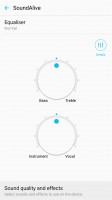
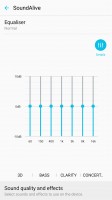
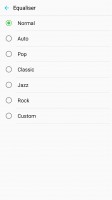
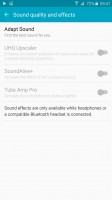
SoundAlive • 7-band equalizer • Adapt Sound
One of the most important additions to the audio credentials of
Samsung Galaxy Note5 is the UHQ Upscaler. Developed by Samsung, the
feature enhances the "sound resolution" of music and video files for
better experience with headphones.
Video player
The video player supports all kinds of video file types and codecs,
up to 4K 2160p encoded with the new H.265/HEVC codec. As with most
phones though, multi-channel audio (AC-3, DTS) is not supported.
The Pop up mode puts the video in a small floating window so you can keep watching while using the phone.
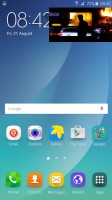

A capable video player right out of the box
There are extensive subtitle settings with adjustable font and text
size, text color, edge and background. Multiple presets are available
and you can make your own.
You can send video files to DLNA players or use screen mirroring.
Alternatively you can beam just the audio over Bluetooth, the Play audio
only option is useful for music videos - playback continues, while you
use the phone as normal.
There are built-in video editing options including trimming, video
color effects and adding background music (with sliders to control the
audio volume from both the video and the background music). A more
advanced video editor can be downloaded. It can assemble multiple videos
and audio tracks together.
Splendid audio quality
The Samsung Galaxy Note5 is yet another member of the series to
deliver seriously impressive audio output. The phablet downright crushed
the first part of our test mixing very loud output with impeccable
quality – nothing to frown at really.
More impressively, plugging in a pair of headphones caused next
to no distortion – even the hike in stereo crosstalk was virtually
unnoticeable. An impressive showing even for the high end class and one
that we wouldn’t call perfect only because the volume levels dropped
from very high to just above average.
And here go the results.
| Test | Frequency response | Noise level | Dynamic range | THD | IMD + Noise | Stereo crosstalk |
| Samsung Galaxy Note5 | +0.04, -0.01 | -93.6 | 93.5 | 0.0024 | 0.0076 | -94.7 |
| Samsung Galaxy Note5 (headphones attached) | +0.02, -0.05 | -93.1 | 93.2 | 0.0023 | 0.030 | -84.1 |
| Samsung Galaxy Note 4 | +0.01, -0.04 | -96.6 | 93.4 | 0.0015 | 0.0086 | -94.2 |
| Samsung Galaxy Note 4 (headphones attached) | +0.03, -0.02 | -96.8 | 93.5 | 0.011 | 0.035 | -55.2 |
| LG G Flex2 | +0.01, -0.06 | -92.5 | 92.5 | 0.0031 | 0.012 | -91.5 |
| LG G Flex2 (headphones attached) | +0.03, -0.10 | -92.6 | 92.1 | 0.0027 | 0.387 | -60.1 |
| +0.04, -0.04 | -94.0 | 94.0 | 0.0013 | 0.0064 | -72.0 | |
| +0.10, -0.04 | -94.0 | 93.9 | 0.0016 | 0.087 | -64.1 | |
| +0.02, -0.08 | -99.4 | 98.9 | 0.0016 | 0.035 | -100.0 | |
| +0.02, -0.09 | -93.7 | 93.3 | 0.0060 | 0.032 | -78.5 | |
| Oppo Find 7 | +0.04, -0.10 | -93.8 | 93.1 | 0.0053 | 0.177 | -94.4 |
| Oppo Find 7 (headphones attached) | +0.70, -0.20 | -93.7 | 91.5 | 0.013 | 0.446 | -52.6 |
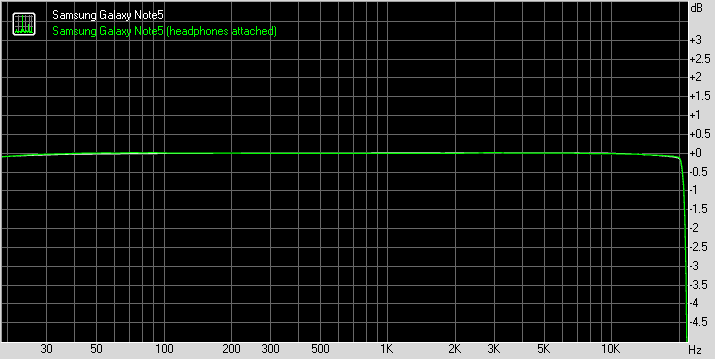
Samsung Galaxy Note5 frequency response
16MP main camera
Samsung has opted to use the superb 16MP Sony IMX240 sensor in the
Galaxy Note5, coupled with f/1.9 lens. That's the same excellent setup
that's found in Samsung Galaxy S6 and Galaxy S6 edge.
One of our favorite features is the quick launch - double press the
Home key from anywhere in the UI and the camera pops up in less than a
second.
The camera UI is pretty simple and most settings are available on the
viewfinder. The selection changes as you go between the different
shooting modes. You can download new shooting modes, but currently only
Sports shot is available.
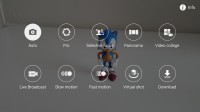
The camera UI
Pro mode lets you control the focus manually, adjust exposure
compensation and ISO, white balance too. You can save the current manual
settings into a preset for easy recall later.
The color adjustments are very advanced - you get several presets
(like color effects), but you can make your own. There are sliders to
boost shadows and reign in highlights, adjust the contrast and
saturation, the temperature and tint. With these you can create
Instagram-y filters or make the best of the camera's dynamic range.

Pro mode
Samsung Galaxy Note5 can also capture images in RAW format. The
latter allow those with a knack for post-processing to really get
creative with their images.
Live Broadcast is a hot new feature that debuted alongside Samsung
Galaxy Note5. The feature is built right into the camera interface and
allows a user to share live feed with the world via YouTube. The feature
requires the user to sign in with a Google account. The setup is quick
and easy.


Live Broadcast
Overall, thanks to the powerful hardware on tap, the camera of
Samsung Galaxy Note5 felt fast and responsive at all times. The shooting
experience it delivers is one of the best in the business.
We can say the same thing about image quality. The images have plenty
of detail, excellent colors and dynamic range and the sharpness is
among the best we've seen on a mobile phone. Low light photos also came
out great.



Camera samples by Samsung Galaxy Note5
The HDR mode does a great job of lighting up the shadows so image
exposure is good even in high-contrast scenes. Thanks to the Live HDR
mode you can see the result of the HDR mode even before you've snapped
the image.




HDR samples by Samsung Galaxy Note5: Off • On
The Galaxy Note5 is equipped with a 5MP front-facing camera, which
has a similar F/1.9 aperture and offers Live HDR and color filters as
well. It has a 120° WideSelfie mode, so it can easily capture group
selfies. You can snap selfies with a tap on the heart-rate sensor on the
back of the phone.

Front camera sample taken by the Samsung Galaxy Note5
And below you can have a detailed look at the Samsung Galaxy Note5 in
our picture compare tool. The tool offers a pixel level look at the
resolving power of the Galaxy Note5's sensor and optics and allows you
to compare it to other phones. Enjoy!
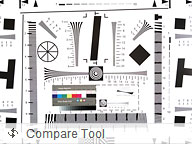


Samsung Galaxy Note5 in our Photo Comparison Tool
4K video capture
There's no dedicated video mode because most settings work for videos
too. Even Pro mode, though you can't adjust the settings during
recording and the autofocus will override your setting as soon as the
video starts.
Anyway, the Samsung Galaxy Note5 tops out at 2160p resolution, but it
can also do QHD video, 1080p at both 30fps and 60fps and 720p video at
up to 120fps (that's handled by the Slow Motion mode).
The 120fps video needs slowing down via a video editor such as the
one on board the Note5 or one on your computer. The frames are all
there, it's just that it's not slow-mo.
The front camera shoots only at 30fps, but it can shoot QHD video to match the phone's screen.
HDR and color effects are available for video, though choosing the
2160p recording mode disables these effects, as well as the option to
take pictures while shooting video, the tracking autofocus and the
additional software stabilization.
Video recording quality is nothing short of exceptional. We've
uploaded a 2160p and a 1080p video to YouTube, so you can see the video
quality yourself.
You can also directly download the following videos straight out the phone:
2160p@30fps (62MB, 10s),
1080p@60fps (35MB, 10s), and
720p@120fps (60MB, 10s).
And last you can have a look at our in-depth video compare tool.
There you can see how the Samsung Galaxy Note5's 2160p video handles
compared to its toughest competitors and if you scroll down in our list
of tested devices you can find the Samsung Galaxy Note5's 1080p video as
well.
Samsung browser and Google Chrome
The Internet app is the Android browser modified by Samsung. It supports multiple tabs (including incognito ones) and if you sign into your Samsung account, it will sync open tabs and bookmarks with other devices on that account.A cool features lets you use your fingerprints to sign into web sites. The first time you enter username and password as normal and then select the option to remember the login using fingerprints. Then when the website asks for a login the phone will prompt you to put your finger on the Home key and a second later the info is filled in and submitted. We found that this doesn't work with all types of login pages, but it should work on most.



The preloaded browser by Samsung is hugely capable
Google Chrome comes on all Android device as part of the Play Services package. It can sync tabs too (based on your Google account) and has the data-saving option of compressing pages before they are sent to the device. It will even automatically detect foreign language sites and offer to translate them.



Google Chrome
Both the Internet app and Chrome support Multi Window.
Other preinstalled apps
Smart Manager shows even more collaboration and is a one-stop shop for maintenance of your device. It's divided into four parts. Battery shows estimated battery life remaining/time until charged and will warn you of abnormal battery usage. The Power saving and Ultra power saving modes can be activated from here.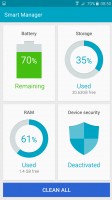
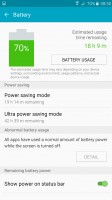

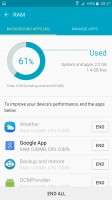
Smart Manager • Battery use • Memory management
The Storage section leans on Clean Master to free up some storage by deleting unnecessary files. RAM closes running apps to free up RAM. Other than misbehaving apps, we can't think of a reason to manually close apps on a 4GB device.
The fourth section is Device security. It offers My KNOX, which create separate working spaces for personal and work apps (think BlackBerry's Balance). KNOX Active Protection promises to safeguard you against hacks - it's disabled by default for casual users and enabled for enterprise users.
It slows down performance a bit and adds 1 second to the boot time. What you get is verification that the system apps haven't been tampered with and real-time kernel protection to avoid unauthorized access from apps to the core of the operating system. There's also a McAfee-powered malware scanner on board.

My KNOX by Samsung
S Health has been polished. It can sync your health data with your Samsung Account (optionally via Wi-Fi only). The new UI uses simple cards that count your steps, offer to measure your heart rate, track what you eat and drink, your sleep and various exercises.
The phone has the hardware to do spot measurements of your heart rate and blood oxygen saturation and estimate stress. You can add external sensors for continuous tracking. The app comes with three built-in programs that will train you, building up to a 10K run. It's not all about exercise, S Health can help you eat healthier or make sure you get proper rest.


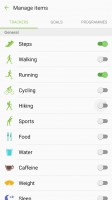

S Health keeps getting better with time
The Voice recorder app has Interview mode, which uses the mic array to suppress sounds from the sides. You can also mute one side of the conversation so only the answers of your interviewee are audible. The other mode is Voice memo, which automatically transcribes the note into text.


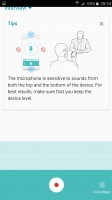
Capable voice recorder
S Planner is the familiar Samsung replacement for the Google calendar. It defaults to a Month and agenda view, and has a clean Material Design interface. You can add a 7-day weather forecast and multiple calendars.



S Planner
The My Files app is the built-in file browser. It's beginner friendly with its Category view (e.g. view all photos), but you can browse the whole internal storage). The app also integrates Google Drive so you can seamlessly handle files in the Google cloud.
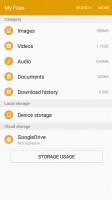

The file manager is quite useful
S Voice is still on board, even though it had to relinquish its traditional shortcut. It can handle a wide variety of voice commands - call or text someone, take down memos and calendar notes, check the weather or read the news, answer spoken questions and so on.


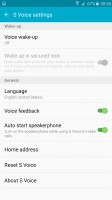
S Voice
The app has no UI, it just needs an initial training (you say an activation phrase four times). Then from anywhere in the UI you speak the phrase and your command, all you'll see is a small graphical equalizer at the bottom of the screen as you speak. Google Now can do plenty of these things (even if it's not as conversational).
There's OneDrive to handle cloud-syncing needs with 100GB of free storage. WhatsApp, Instagram, and Facebook Messenger are also on board, tucked into a dedicated folder.
Jika Anda menyukai Artikel di blog ini, Silahkan
klik disini untuk berlangganan gratis via email, dengan begitu Anda akan mendapat kiriman artikel setiap ada artikel yang terbit di Blog Sharing
